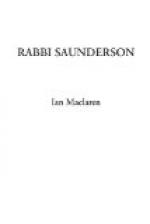He put Jamie’s ecclesiastical history into a state of thorough repair
The farmers carted the new minister’s furniture
from the nearest railway station
Searching for a lost note
The suddenness of his fall
“Some suitable sum for our brother here who
is
passing through adversity”
“We shall not meet again in this world”
When Carmichael gave him the cup in the sacrament
“Shall . . . not . . . the . . . Judge
. . . of all the
earth . . . do . . . right?”
“You have spoken to me like a father: surely that is enough”
Then arose a self-made man
He watched the dispersion of his potatoes with dismay
He signed for her hand, which he kept to the end
A SUPRA-LAPSARIAN
Jeremiah Saunderson had remained in the low estate of a “probationer” for twelve years after he left the Divinity Hall, where he was reported so great a scholar that the Professor of Apologetics spoke to him deprecatingly, and the Professor of Dogmatics openly consulted him on obscure writers. He had wooed twenty-three congregations in vain, from churches in the black country, where the colliers rose in squares of twenty, and went out without ceremony, to suburban places of worship, where the beadle, after due consideration of the sermon, would take up the afternoon notices and ask that they be read at once for purposes of utility, which that unflinching functionary stated to the minister with accuracy and much faithfulness. Vacant congregations desiring a list of candidates, made one exception, and prayed that Jeremiah should not be let loose upon them, till at last it came home to the unfortunate scholar himself that he was an offence and a by-word. He began to dread the ordeal of giving his name, and, as is still told, declared to a household, living in the fat wheatlands and without any imagination, that he was called Magor Missabib. When a stranger makes a statement of this kind to his host with a sad seriousness, no one judges it expedient to offer any remark; but it was skilfully arranged that Missabib’s door should be locked from the outside, and one member of the household sat up all night. The sermon next day did not tend to confidence—having seven quotations in unknown tongues—and the attitude of the congregation was one of alert vigilance; but no one gave any outward sign of uneasiness, and six able-bodied men, collected in a pew below the pulpit, knew their duty in an emergency.




